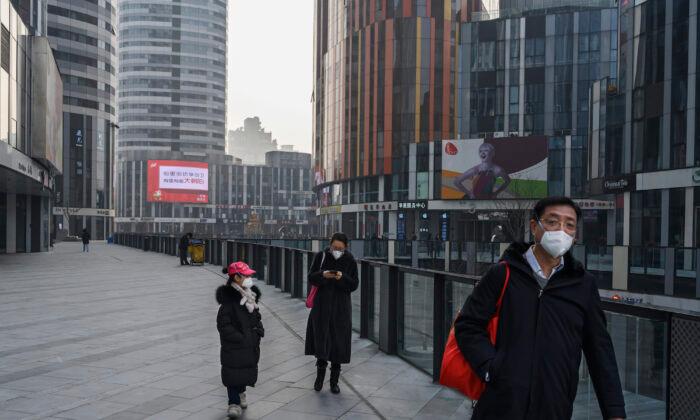Commentary
In 2018, President Trump warned the U.S. military establishment against overreliance on China for critical parts and elements. His “Buy American” initiative was intended to avoid supply chain leverage that China could use to hobble the United States during tense situations—such as a trade war—or a potential conflict.
As a result, some defense companies began to look at other locations outside of China, even bringing factories back to the United States.
But as the trade war escalated, other industries began to move out of China to avoid the tariffs and other associated costs of doing business there. That trend continues to grow. If it made perfect sense then—and it did—it makes even more sense today.
With the outbreak of the deadly coronavirus, that same argument applies to the rest of American industry with an added urgency. If the trajectory of the disease continues, the outcomes are predictable. Disruptions in supply chains are likely to be felt in the very near future. In fact, in a number of verticals, U.S. China-based manufacturing supply chains are already on the verge of disruption.
Apple the First Victim?
Apple is one of them. The extent of the anticipated supply disruption is not yet known, but Apple suppliers are sure that it’s coming. The most immediate impact is that deliveries of iPhone 9s are expected to be delayed.Even though Apple’s nearest and largest iPhone factory complex, known as “iPhone City” is about a six-hour drive from the epicenter of the outbreak in Wuhan, other minor suppliers are affected. Wuhan, of course, is under quarantine, along with another 17 or so cities across China. At this point, the number of quarantined cities is expected to continue to rise. As more cities go on lockdown to contain the outbreak, and the Chinese regime applies tighter travel restrictions, more factories will face potential worker shortages or even extended shutdowns.
Apple may be one of the biggest names to feel the supply disruption, but it certainly won’t be the last.
Pharmaceuticals are at Risk
Much more disconcerting than a delayed shipment of iPhones, however, is the threat that the coronavirus outbreak poses to the global pharmaceutical industry. China produces more active pharmaceutical ingredients than any other country in the world. There isn’t a disruption in supplies just yet, but the potential is certainly there.As Dr. Amesh Adalja, an infectious disease specialist at Johns Hopkins warned, “Any kind of supply shock or instability would render the drug supply vulnerable, (and) with this outbreak, it is concerning whether or not the stability of our supply chain will remain intact.”
Adalja also noted that there are “national security implications of a heavy dependence on China and other countries for vital medicine and medical supplies.”
And why wouldn’t there be?
China’s drug factories account for 13 percent of those that make ingredients for drugs sold in the United States. And of the drugs in the U.S. strategic national stockpile, 85 percent are made of China-sourced ingredients. Unfortunately, even though there are other sources for most vitamins, China has a virtual lock on the basic ingredients.
Medical Supplies May Be Impacted, Too
Medical product supply chains are also at risk. Perhaps one of the most powerful ironies that underscores the risk of overreliance on China is the fact that China’s medical mask manufacturers can’t produce enough of the very masks that people need to protect themselves from the deadly virus. The deadly virus isn’t the only medical emergency, it’s potentially creating medical supplies and pharmaceutical emergencies as well.As the outbreak continues, other vertical markets face similar supply challenges as Apple and medical industries. Although it’s less serious than pharmaceuticals or national defense products, global carmakers are or will soon be seeing their supply lines disrupted. That’s due to the fact that Hubei Province, where Wuhan is located, is home to many car parts manufacturers.
This will mean that the auto industry will see disruptions sooner than later as employees are asked to remain at home. A recent report has confirmed that four auto workers for a German carmaker have come down with the coronavirus. Business is also coming to a halt from outside of China as well. Foreigners with business interests in China are delaying or canceling their trips there, and even their business relationships, resulting in further lost business opportunities.
To its great discredit, the Chinese regime has been deceptive and dangerous in its underreporting of the number of sick and dead, as well as its delayed reporting of the outbreak in the first place. That sad fact also leads many to believe that the disease is spreading faster than we’ve been told. Also, the lack of reliable information from the Chinese regime has led to rumors and fears of the unknown.
In 2019, President Trump told American companies to get out of China. Some have, most haven’t. That is likely to change in 2020.
James Gorrie is a writer and speaker based in Southern California. He is the author of “The China Crisis.”
Views expressed in this article are opinions of the author and do not necessarily reflect the views of The Epoch Times.






Friends Read Free